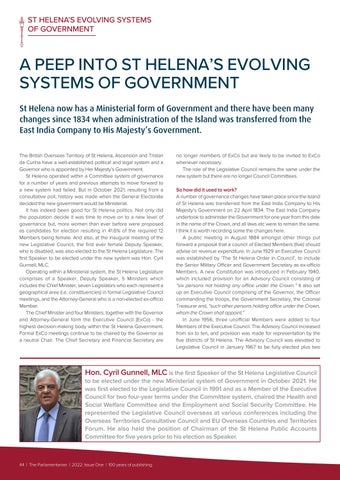ST HELENA’S EVOLVING SYSTEMS OF GOVERNMENT
A PEEP INTO ST HELENA’S EVOLVING SYSTEMS OF GOVERNMENT St Helena now has a Ministerial form of Government and there have been many changes since 1834 when administration of the Island was transferred from the East India Company to His Majesty’s Government. The British Overseas Territory of St Helena, Ascension and Tristan da Cunha have a well-established political and legal system and a Governor who is appointed by Her Majesty’s Government. St Helena operated within a Committee system of governance for a number of years and previous attempts to move forward to a new system had failed. But in October 2021, resulting from a consultative poll, history was made when the General Electorate decided the new government would be Ministerial. It has indeed been good for St Helena politics. Not only did the population decide it was time to move on to a new level of governance but, more women than ever before were proposed as candidates for election resulting in 41.6% of the required 12 Members being female. And also, at the inaugural meeting of the new Legislative Council, the first ever female Deputy Speaker, who is disabled, was also elected to the St Helena Legislature. The first Speaker to be elected under the new system was Hon. Cyril Gunnell, MLC. Operating within a Ministerial system, the St Helena Legislature comprises of a Speaker, Deputy Speaker, 5 Ministers which includes the Chief Minister, seven Legislators who each represent a geographical area (i.e. constituencies) in formal Legislative Council meetings, and the Attorney-General who is a non-elected ex-officio Member. The Chief Minister and four Ministers, together with the Governor and Attorney-General form the Executive Council (ExCo) - the highest decision-making body within the St Helena Government. Formal ExCo meetings continue to be chaired by the Governor as a neutral Chair. The Chief Secretary and Financial Secretary are
no longer members of ExCo but are likely to be invited to ExCo whenever necessary. The role of the Legislative Council remains the same under the new system but there are no longer Council Committees. So how did it used to work? A number of governance changes have taken place since the Island of St Helena was transferred from the East India Company to His Majesty’s Government on 22 April 1834. The East India Company undertook to administer the Government for one year from this date in the name of the Crown, and all laws etc were to remain the same. I think it is worth recording some the changes here. A public meeting in August 1884 amongst other things put forward a proposal that a council of Elected Members (five) should advise on revenue expenditure. In June 1929 an Executive Council was established by ‘The St Helena Order in Council’, to include the Senior Military Officer and Government Secretary as ex-officio Members. A new Constitution was introduced in February 1940, which included provision for an Advisory Council consisting of “six persons not holding any office under the Crown.” It also set up an Executive Council comprising of the Governor, the Officer commanding the troops, the Government Secretary, the Colonial Treasurer and, “such other persons holding office under the Crown, whom the Crown shall appoint.” In June 1956, three unofficial Members were added to four Members of the Executive Council. The Advisory Council increased from six to ten, and provision was made for representation by the five districts of St Helena. The Advisory Council was elevated to Legislative Council in January 1967 to be fully elected plus two
Hon. Cyril Gunnell, MLC is the first Speaker of the St Helena Legislative Council
to be elected under the new Ministerial system of Government in October 2021. He was first elected to the Legislative Council in 1991 and as a Member of the Executive Council for two four-year terms under the Committee system, chaired the Health and Social Welfare Committee and the Employment and Social Security Committee. He represented the Legislative Council overseas at various conferences including the Overseas Territories Consultative Council and EU Overseas Countries and Territories Forum. He also held the position of Chairman of the St Helena Public Accounts Committee for five years prior to his election as Speaker.
44 | The Parliamentarian | 2022: Issue One | 100 years of publishing



